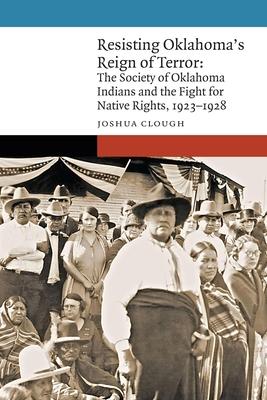The oil and natural gas boom in pre-World War I Oklahoma brought unbelievable wealth to thousands of tribal citizens in the state on whose lands these minerals were discovered. However, as Angie Debo recognizes in her seminal study of the period, And Still the Waters Run, and, more recently, as David Grann does in Killers of the Flower Moon, this affluence placed Natives in the crosshairs of unscrupulous individuals. As a result, this era was also marked by two of the most heinous episodes of racial violence in the state’s history: the Tulsa Race Massacre of 1921 and the Osage Murders between 1921 and 1925.
In Resisting Oklahoma’s Reign of Terror Joshua Clough details the responses of one largely forgotten Native organization--the Society of Oklahoma Indians (SOI)--to the violence and pillaging of tribal resources during the 1920s. Clough provides historical understanding of its formation and its shared values of intertribal unity, Native suffrage, and protection of Native property. He also reveals why reform efforts were nearly impossible in 1920s Oklahoma and how this historical perspective informs today’s conflicts between the state and its Indigenous inhabitants. Through this examination of the SOI, Clough fills the historiographic gap regarding formal Native resistance between the dissolution of the national Society of American Indians in 1923 and the formation of the National Congress of American Indians in 1944. Dismissed or overlooked for a century as an inconsequential Native activist organization, the history of the SOI, when examined carefully, reveals the sophistication and determination of tribal members in their struggle to prevent depredations on their persons and property.| FindBook |
|
有 1 項符合
Resisting Oklahoma’s Reign of Terror: The Society of Oklahoma Indians and the Fight for Native Rights, 1923-1928的圖書 |
 |
$ 3900 | Resisting Oklahoma’s Reign of Terror: The Society of Oklahoma Indians and the Fight for Native Rights, 1923-1928
作者:Clough 出版社:University of Nebraska Press 出版日期:2024-05-01 語言:英文 規格:精裝 / 358頁 / 22.86 x 15.24 cm / 普通級/ 初版  看圖書介紹 看圖書介紹
|
|
|
圖書介紹 - 資料來源:博客來 評分:
圖書名稱:Resisting Oklahoma’s Reign of Terror: The Society of Oklahoma Indians and the Fight for Native Rights, 1923-1928
|











